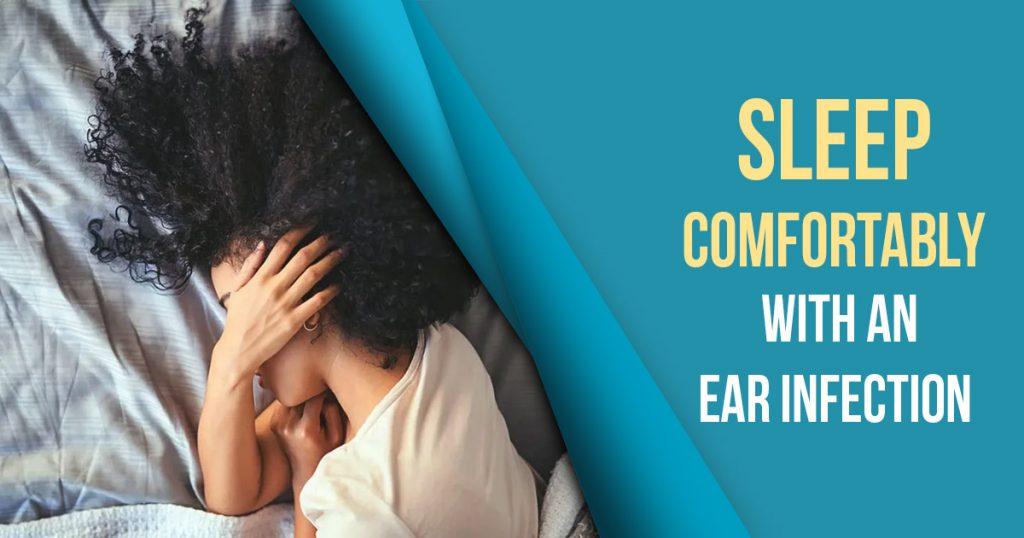Ear infections can be painful and disruptive, especially when trying to get a good night’s sleep. If you have an ear infection, finding an easy and useful way to sleep will greatly help. Learn how to sleep with an ear infection, including the best positions and additional tips to help you sleep better.
Understanding Ear Infections
Ear infections happen when bacteria or viruses get into the middle ear and make it swell and hurt. Symptoms often include ear pain, fullness in the ear, fluid drainage, and sometimes fever.
There are three main types of ear infections:
- Otitis Externa (Swimmer’s Ear): Infection of the outer ear canal.
- Otitis Media: Ear infections occur when bacteria or viruses infiltrate the middle ear, causing swelling and pain.
- Labyrinthitis: Infection of the inner ear impairs balance.
No matter the type, the pain and pressure from ear infections can interfere with sleep. Here’s how to manage your sleep when dealing with this condition.
How to sleep with an ear infection?
Here are some simple strategies and tips for sleeping better during an ear infection:
1. Choosing the Right Sleeping Position
Finding the correct positions can help you sleep with an ear infection. The position you sleep in greatly impacts your comfort and the intensity of your symptoms. If you’re wondering what side to sleep on with an ear infection, here are some guidelines:
- Sleep on the Opposite Side: If your ear infection is in one ear, try sleeping on the side opposite the affected ear. This can help minimize pressure on the infected ear and prevent further irritation.
- Elevate Your Head: Keeping your head up can help prevent fluid buildup and relieve ear pressure. Use an additional pillow or wedge pillow to stay elevated throughout the night.
- Avoid Sleeping Flat: Sleeping flat on your back may worsen the pain by increasing pressure in the ear. If possible, prop yourself up to achieve a more comfortable position.
Best Sleeping Position to Drain Ears
Sleeping in a position that encourages ear drainage can also be helpful. The following positions might assist in draining fluid from the ear:
- Side Sleeping with Head Elevated: Sleep on your side with your head elevated using a pillow. This allows any fluid in the ear to drain spontaneously due to gravity.
- Sleeping with a Slight Incline: Use a reclining chair or an adjustable bed to keep your head and upper body slightly inclined.
2. Managing Ear Pain
Proper positioning is only one part of managing ear pain during sleep. Here are additional tips on how to lay with an ear infection to stay comfortable:
- Use Warm Compresses: A warm compress applied to the afflicted ear can help relieve pain. Ensure the compress is not too hot, and apply it for 20 minutes before bedtime.
- Avoid Ear Pressure: Refrain from activities that might pressure the ear, such as sleeping on your stomach or pressing your ear against the pillow.
- Try Over-the-Counter Pain Relief: If your doctor agrees, consider taking over-the-counter pain relievers to alleviate your discomfort and help you sleep better.
3. Creating a Comfortable Sleep Environment
Your sleep environment can also impact your comfort while dealing with an ear infection. Consider these tips:
- Maintain a Quiet Environment: Minimize noise in your bedroom to prevent further irritation. If necessary, use earplugs to block out sound.
- Keep Your Room Cool: A cool, well-ventilated room can help you sleep better and avoid feeling stuffy, which can exacerbate ear infection symptoms.
- Use Soft, Hypoallergenic Pillows: Opt for soft and hypoallergenic pillows to reduce irritation and pressure on your ear.
4. When to Seek Medical Advice
If your ear infection continues to worsen, speak with a doctor. Persistent discomfort, significant hearing loss, or severe symptoms may signal a more serious problem requiring medical care.
Additional Tips for Managing Ear Infections
Here are some more tips to help manage your ear infection and improve your sleep:
- Hydrate Well: Drinking fluids can help keep your mucus thin and promote drainage.
- Avoid Allergens: Avoid allergens and irritants that can worsen ear infections and cause additional discomfort.
- Follow Medical Advice: Adhere to any treatment or medication your healthcare provider prescribes to address the infection and manage symptoms effectively.
If you’re still struggling with sleep despite trying these tips, consider these additional strategies:
- Experiment with Different Positions: Finding the most comfortable position might take some experimentation. Test different angles and heights until you find what works best for you.
- Stay Consistent: Establish a consistent sleep routine to help your body adjust to new sleep positions and strategies.
Achieve a Good Night’s Sleep Even With an Ear Infection
Dealing with an ear infection can make it hard to sleep. Try sleeping on the side opposite the infected ear to improve your rest and keep your head elevated. Using warm compresses, creating a quiet and calm sleep environment, and staying hydrated can also help. If your symptoms continue or get worse, be sure to see a doctor. These tips can help you sleep better and manage the discomfort of an ear infection.
